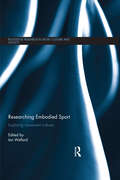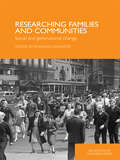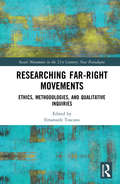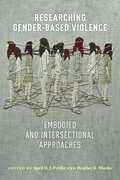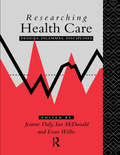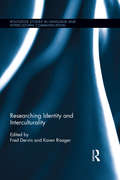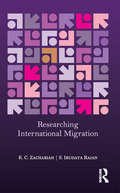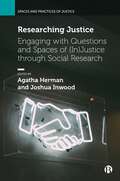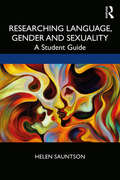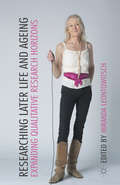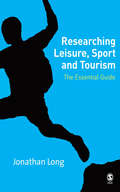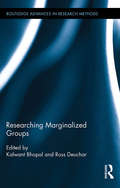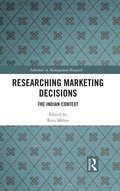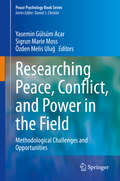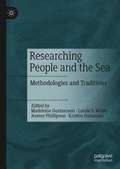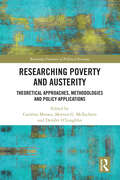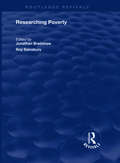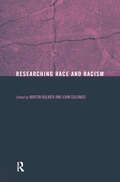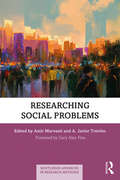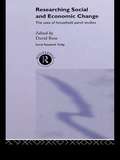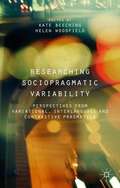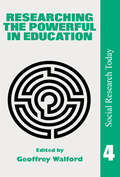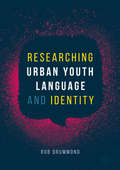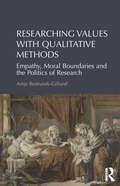- Table View
- List View
Researching Embodied Sport: Exploring movement cultures (Routledge Research in Sport, Culture and Society)
by Ian WellardDespite a growing interest in the sociology of the body, there has to date been a lack of scholarly work addressing the embodied aspects which form a central part of our understanding and experience of sport and movement cultures. Researching Embodied Sport explores the political, social and cultural significance of embodied approaches to the study of sport, physical activities and dance. It explains how embodied approaches fit with existing theory in studies of sport and movement cultures and makes a compelling case for incorporating an embodied approach into the study of sporting practices and experience. The book adopts a multi-disciplinary lens, moving beyond the traditional dualism of body and mind, and incorporating the physical with the social and the psychological. It applies key theories that have shaped our thinking about the body and sport, and examines both the personal, subjective experience of sporting activities and those experiences involving engagement and contact with other people, in team sports for example. The book also explores the methodological implications of ‘doing’ embodied research, particularly in terms of qualitative approaches to sports research. Written by a team of leading international sports researchers, and packed with vivid examples from sporting contexts as diverse as surfing, fell running, korfball and disability sport, Researching Embodied Sport is fascinating reading for any advanced student or researcher working in the sociology of sport, physical cultural studies, physical education, body studies or health studies.
Researching Families and Communities: Social and Generational Change (Relationships and Resources)
by Rosalind EdwardsRecent years have seen a concern with how family and community relationships have changed across the generations, whether for better or worse, and particularly how they have been affected by social and economic developments. But how can we think about and research the nature of the present in relation to the past and vice versa? Researching Families and Communities: Social and Generational Change explores the concepts and perspectives that guide research and the methods used to explore change during the last half of the twentieth century and into the new millennium. It highlights the complexities of continuities alongside change, the importance of the perspectives that shape investigation, and the need to engage with situated data. This edited text includes contributions from experts in their field who: address these overarching trends explore the possibilities and practice of secondary analysis or replication studies, as well as longitudinal large scale data sets discuss varied aspects of family and community life, including sexuality, ethnicity, parenting resources, older people, intergenerational family life, solo living and many others. This book will appeal to academics and students interested in family and community across a range of social science disciplines, and to those in the social research field.
Researching Far-Right Movements: Ethics, Methodologies, and Qualitative Inquiries (Social Movements in the 21st Century: New Paradigms)
by Emanuele ToscanoAs extreme and far right movements become increasingly widespread in many countries, the sociology of social movements is called to confront them. This book addresses the specific challenges entailed by the empirical study of such movements, presenting case studies from Japan, Thailand, England, France, Italy, the USA, and Turkey. Based on empirical fieldwork, the chapters explore the ethics and politics of researching far right movements, considering the researcher's reflexivity and the methodological issues raised by being emotionally linked to a research object that affirms and strives for values that differ markedly from those of the researcher. As such, it will appeal to scholars of sociology and politics with interests in social movements and research methods.
Researching Gender-Based Violence: Embodied and Intersectional Approaches
by Heather R. Hlavka April D. J. PetilloAn interdisciplinary collection of critical, feminist reflections on interpersonal gender violenceDespite the growing interest in the subject of gender violence, surprisingly little has been written in recent years about the methodology behind this emerging field of research. This interdisciplinary collection seeks to fill this gap by empowering scholars to conduct gender violence research in ways that deconstruct rather than reinforce existing power structures and hierarchies. The book argues for new approaches to research and activism on gender-based violence grounded in the intersectional realities of individuals and communities. Each chapter discusses the role of reflective methodologies to recognize institutional and intersectional inequalities, challenging the reader to contemplate ethical considerations of an embodied feminist methodology when researching gender-based violence. By centering these issues for applied scholars, practitioners, and academic activists, the book offers insights about where sociocultural notions of criminality and innocence might align across geographies of gender-based violence.The volume encourages further thinking about embodied methodological creativity in and for the future of interpersonal gender-based violence research. A powerful tool for conducting productive scholarship, Researching Gender-Based Violence provides recommendations for interrogating, practicing, and collaborating across fields, disciplines, and lived realities.
Researching Health Care
by Ian McDonald Evan Willis Jeanne DalyFirst Published in 1992. Health care is currently under intense pressure both to be cost-effective and to deliver a service its users want. This text is an important contribution to the debate about the most appropriate research method for evaluating its effectiveness.
Researching Identity and Interculturality (Routledge Studies in Language and Intercultural Communication #3)
by Fred Dervin Karen RisagerThis volume focuses on advances in research methodology in an interdisciplinary field framed by discourses of identity and interculturality. It includes a range of qualitative studies: studies of interaction, narrative studies, conversation analysis, ethnographic studies, postcolonial studies and critical discourse studies, and emphasizes the role of discourse and power in all studies of identity and interculturality. The volume particularly focuses on critical reflexivity in every stage of research, including reflections on theoretical concepts (such as ‘identity’ and ‘interculturality’) and their relationship with methodology and analytical practice, reflections on researcher identity and subjectivity, reflections on local and global contexts of research, and reflections on language choice and linguacultural aspects of data generation, analysis and communication.
Researching International Migration: Lessons from the Kerala Experience
by S. Irudaya Rajan K. C. ZachariahInternational migration and workers’ remittances have, of late, become a significant economic and social phenomena affecting the fortunes of millions of families in the developing countries of Asia, Africa and Latin America. Yet, the measurements and methods of analysis of their impact on the individuals, families, economy, and society have not received the attention they deserve. A first-of-its-kind study of international migration, based on large-scale surveys across a span of 15 years of fieldwork, this book: includes methods of conducting field surveys, estimating migration, and analysing migration trends, remittances, selectivity, and differentials; assesses other demographic, socio-economic phenomenon, such as education, employment and women’s status; provides a methodology to evaluate remittances and their influence on the economy; and examines social costs of migration on those left behind — parents, wives and children — a neglected area in the field of migration. This handbook will be invaluable to scholars and students of migration studies, demography, development studies and sociology as well as policy-makers, administrators, academics, and non-governmental organisations in the field.
Researching Justice: Engaging with Questions and Spaces of (In)Justice through Social Research (Spaces and Practices of Justice)
by Richard White Don Mitchell Simon Springer Andrew McGregor Elizabeth Mavroudi Corine Wood-Donnelly Jen Dickinson Jennifer Balint Deepti Chatti Barbora Adlerova Ana Moragues Faus Ophélie Véron Natasha Uwimanzi Kate DericksonUnderstanding justice, for many, begins with questions of injustice. This volume pushes us to consider the extent to which our scholarly and everyday practices are, or can become, socially just. In this edited collection, international contributors reflect on what the practice of ‘justice’ means to them, and discuss how it animates and shapes their research across diverse fields from international relations to food systems, political economy, migration studies and criminology. Giving insights into real life research practices for scholars at all levels, this book aids our understanding of how to employ and live justice through our work and daily lives.
Researching Language, Gender and Sexuality: A Student Guide
by Helen SauntsonResearching Language, Gender and Sexuality leads students through the process of undertaking research in order to explore how gender and sexuality are represented and constructed through language. Drawing on international research, Sauntson incorporates a fluid understanding of genders and sexualities and includes research on a diverse range of identities. This accessible guidebook offers an outline of the practical steps and ethical guidelines involved when gathering linguistic data for the purpose of investigating gender and sexuality. Each chapter contains up-to-date information and empirical case studies that relate to a range of topics within the field of language, gender and sexuality, as well as suggestions for how students could practically research the areas covered. Student-friendly, this is essential reading for undergraduate and postgraduate students of English language, linguistics and gender studies.
Researching Later Life and Ageing: Expanding Qualitative Research Horizons
by Miranda LeontowitschThis collection on researching later life and ageing critically reflects upon the qualitative methods used in gaining knowledge of under-researched groups of older people and sets out future research agendas.
Researching Leisure, Sport and Tourism: The Essential Guide
by Jonathan A LongGood entry level text that new students will really appreciate. Clearly written in a style that aids understanding and will develop their knowledge and ability to apply research techniques. - Shane Thurlow, Bishop Burton College "Essential elements associated with research in the fields of leisure, sport and tourism are introduced and explained in a clear manner. This book is informative and easy to read... ideal for those who are not familiar with research in those field." - Miyoung Oh, Sheffield Hallam University "This book would be useful for any leisure, sport, or tourism student who has no previous knowledge of research methods. Its style and language make it particularly useful for first year students in degree or diploma programs." - Annals of Tourism Research "The style of writing is wonderfully clear and the author explains areas such as sampling and significance in a much better way than many very well known texts. It will be an incredibly useful book for students." - Malcolm Williams, University of Plymouth What are the essential research methods for students studying leisure, sport and tourism? What are the main benefits in competing research methods, and how can you avoid gremlins in the research process? This is a comprehensive and informative book written especially for new and inexperienced researchers in the fields of leisure, sport and tourism. Unlike generic research texts that do not ′speak′ to people in this field, this book uses subject-specific examples and explains the central methodological issues in straightforward terms. By showing students what they can do to assess, manage and reduce the time they spend on research Researching in Leisure, Sport and Tourism: The Essential Guide will help them achieve a better balance in their course work.
Researching Marginalized Groups (Routledge Advances in Research Methods #14)
by Kalwant Bhopal Ross DeucharThis edited collection explores issues that arise when researching "hard-to-reach" groups and those who remain socially excluded and marginalized in society, such as access, the use of gatekeepers, ethical dilemmas, "voice," and how such research contributes to issues of inclusion and social justice. The book uses a wide range of empirical and theoretical approaches to examine the difficulties, dilemmas and complexities surrounding research methodologies with particular groups. It emphasizes the importance of national and international perspectives in such discussions, and suggests innovative methodological procedures.
Researching Marketing Decisions: The Indian Context
by Ritu MehtaThis book looks at customer value creation through marketing decisions and analyses the critical phases of theoretical and methodological advancements in solving certain problems and customer-centric issues that firms face. The chapters highlight how theories have been borrowed from sociology, psychology and economics to understand phenomena such as customer preferences and decision-making, and how operations research and statistical tools have been applied to take optimal decisions on marketing-related issues such as channel management and pricing. <p><p>The volume covers an array of topics including marketing orientation, consumer behaviour, and marketing mix comprising the elements of product, price, promotion and place. The articles offer both methodological and theoretical contributions, and also discuss some key results of implementation of marketing strategies by various firms. <p><p>This book will be of interest to researchers and students of marketing, consumer behaviour, business management, economics, finance, international marketing, services marketing and international business.
Researching Peace, Conflict, and Power in the Field: Methodological Challenges and Opportunities (Peace Psychology Book Series)
by Yasemin Gülsüm Acar Sigrun Marie Moss Özden Melis UluğThis edited volume offers useful resources for researchers conducting fieldwork in various global conflict contexts, bringing together a range of international voices to relay important methodological challenges and opportunities from their experiences. The book provides an extensive account of how people do conflict research in difficult contexts, critically evaluating what it means to do research in the field and what the role of the researcher is in that context. Among the topics discussed:Conceptualizing the interpreter in field interviews in post-conflict settingsData collection with indigenous peopleChallenges to implementation of social psychological interventionsResearching children and young people’s identity and social attitudesInsider and outsider dynamics when doing research in difficult contextsWorking with practitioners and local organizations Researching Peace, Conflict, and Power in the Field is a valuable guide for students and scholars interested in conflict research, social psychologists, and peace psychologists engaged in conflict-related fieldwork.
Researching People and the Sea: Methodologies and Traditions
by Madeleine Gustavsson Carole S. White Jeremy Phillipson Kristen OunanianIn this unique edited collection, social scientists reflect upon and openly share insights gathered from researching people and the sea. Understanding how people use, relate to and interact with coastal and marine environments has never been more important, with social scientists having an increasingly vital contribution to make. Yet practical experiences in deploying social science approaches in this field are typically hidden away in field notes and unpublished doctoral manuscripts, with the opportunity for shared learning that comes from doing research often missed. There is a need for reflection on how social science knowledge is produced. This collection presents experiences from the field, its necessary reflexivity and innovation in methods, and the challenges and opportunities of translating across disciplines and policy. It brings to light the tacit expertise needed to study people and the sea and offers lessons which readers could employ in their own research. With a focus on the future direction of marine social sciences, the volume is highly relevant to masters and doctoral students and more experienced researchers engaged in studying people and the sea, as well as policy makers, practitioners and scientists wishing to understand the social dimension of marine and coastal environments. Chapters 2 and 3 are available open access under a Creative Commons Attribution 4.0 International License via link.springer.com.
Researching Poverty and Austerity: Theoretical Approaches, Methodologies and Policy Applications (Routledge Frontiers of Political Economy)
by Caroline Moraes Morven G. McEachern Deirdre O’LoughlinPoverty is a complex global challenge rooted in intertwined social, economic and political factors, which excludes people from participating fully in normalised social and market-based activities. The COVID-19 pandemic has exacerbated poverty-related issues such as food insecurity, and growing numbers of people are having to rely on welfare assistance. This pandemic, coupled with austerity measures implemented across many European countries over the past years, has impacted negatively on towns, cities, regions and countries, leaving places and communities depleted. This edited volume curates a collection of relevant research addressing the challenges of poverty and the political-economic measures that perpetuate it. It adopts a cross-disciplinary approach to covering relevant theories, methodologies and policy-oriented research, highlighting the interlinkages between poverty and austerity that have resulted since the 2008 financial crisis. In particular, the book focuses on food insecurity as one of the most extreme manifestations of poverty but also addresses interconnected issues such as unemployment, homelessness and poor health. The contributors primarily utilise diverse qualitative methods that give voice to lived experiences of poverty while also considering quantitative approaches that are essential for measuring food insecurity and modelling the impacts of austerity. The book will be of significant interest to anyone researching poverty and austerity with an interest in social policy, human and cultural geography, marketing and consumer culture, economic policy, public health and sustainability.
Researching Poverty: 100 Years Since Seebohm Rowntree's First Study Of Poverty In York (Routledge Revivals)
by Jonathan Bradshaw Roy SainsburyThis title was first published in 2000: This collection of papers reviews the theory, method and policy relevance of post-war poverty research. It is designed to contribute to bringing high quality research in this area back to the centre of both social research and informed policy debate.
Researching Race and Racism (Social Research Today)
by John Solomos Martin BulmerRace and racism have become huge areas of study in the social sciences over the past two decades. However, whilst this has been reflected in the growing body of theoretical and empirically based work, surprisingly little has been published that explores the methodological and practical issues involved in researching race. In Researching Race and Racism Martin Bulmer and John Solomos have brought together contributions from some of the leading researchers in the field, using the benefit of their experience to explore the practical and ethical issues involved in doing research in this sometimes controversial, often heavily politicised field. This book will provide students and researchers - both new to the field and experienced alike - with an invaluable tool to help them find their way.
Researching Resilience
by Michael Ungar Linda LiebenbergWhile categorization has always been one of the primary focuses of the social sciences, recent trends within these disciplines have tended to categorize various behaviours as disorders. Researching Resilience challenges this tendency to pathologize, and marks a profound shift in research methods from the study of disorder to the study of well-being.This collection assembles qualitative and quantitative studies from a diverse group of scholars and disciplines, stressing the importance of studying the strength and resilience of youth who are faced with adversity. Working with youth in a variety of cultures and contexts, the contributors provide critically astute analyses of existing scholarship as well as rigorous methods for conducting resilience research in less Eurocentric and more culturally sensitive ways.An important collection, Researching Resilience is unique in approaching interventions with youth specifically from the point of view of research methods and challenges.
Researching Social Problems (Routledge Advances in Research Methods)
by Amir Marvasti A. Javier TreviñoThis book covers a wide range of contemporary methods for researching social problems and connects these approaches to the broader substance and theories of social problems. Expository and discursive in approach, chapters follow a uniform structure, with each offering research examples and a broad description of the related method and its theoretical context, together with a "how-to" guide for applying that method using substantive examples from the field of social problems. For every method explored, there is a research example that fully reviews and illustrates the application of the particular method, before giving a full assessment of the method’s strengths and weaknesses and latest developments. With chapters exploring survey interviews, in-depth interviews, narrative inquiry, institutional ethnography, participatory action research, auto-ethnography, Actor-Network Theory, experimental research, visual research methods, and research ethics, Researching Social Problems will appeal to scholars and students of sociology and politics working in the fields of research methods and social problems.
Researching Social and Economic Change: The Uses of Household Panel Studies (Social Research Today Ser. #Vol. 12)
by David RoseIn this user-friendly introduction, European and American experts in the field join forces to explain what panel studies can achieve and to illustrate some of the potential pitfalls in the construction and analysis of panel data. Household panel studies provide one of the most significant national and international resources for analysing social and economic change. This is an essential and accessible introduction for those contemplating the use of panel studies for the first time and will be an invaluable resource for both practising researchers and the commissioners of research.
Researching Sociopragmatic Variability: Perspectives from Variational, Interlanguage and Contrastive Pragmatics
by Kate Beeching Helen WoodfieldResearching Sociopragmatic Variability showcases a range of research approaches to the study of speech acts and pragmatic markers across different languages and varieties of a language, investigating native and non-native usages and variation across gender, situation and addressee.
Researching The Powerful In Education (Social Research Today Ser. #Vol. 4)
by Geoffrey WalfordEducationalists offer an overview of methods for researching those in positions of power. They focus on key issues with broad relevance to social scientists such as access, interviewing, data restrictions, ethical dilemmas and the role of theory.; This book is intended for academic and postgraduate researchers within education, sociology, social policy and politics as well as advanced undergraduates involved with research dissertations. The book's international appeal is enhanced by the contributions of US and UK authors.
Researching Urban Youth Language and Identity
by Rob DrummondThis book examines how urban adolescents attending a non-mainstream learning centre in the UK use language and other semiotic practices to enact identities in their day-to-day lives. Combining variationist sociolinguistics and ethnographically-informed interactional sociolinguistics, this detailed and highly reflexive account provides rich descriptions and discussions of the linguistic processes at work in a previously underexplored research environment. In doing so, it reveals fresh insights into the changes taking place in urban British English, and into the difficulties of undertaking ethnographic, sociolinguistic research in a challenging context using a combination of methods and approaches. This interdisciplinary work will appeal to students and scholars from across the fields of sociolinguistics, ethnography, and education; as well as providing a valuable resource for teachers and trainees.
Researching Values with Qualitative Methods: Empathy, Moral Boundaries and the Politics of Research
by Antje Bednarek-GillandIn several branches of social science, interest in values and moral evaluations has increased in recent years, with group values taking centre-stage, yet a satisfactory, theoretical account of the concept of values and their role in social life remains lacking. Engaging with theories of value formation and the role of values in everyday life found in ethics, classical sociology and contemporary social theory and their implications for empirical work, Researching Values with Qualitative Methods argues for a pragmatist approach both to understanding values and the manner in which they are formed, as well as exploring the ways in which they can be studied empirically, using qualitative research methods. In this way, this book promises to resolve many of the practical problems involved in fieldwork with political groups, including the prominent question of how to account for the researcher's own values. Illustrated with examples from published as well as new research, this book provides the foundation for the theoretical understanding of values and their empirical investigation, thus strengthening the connection between social theory and the development of research methods. As such, it will be of interest to sociologists, anthropologists and geographers with interests in values, social theory and research methodology.
